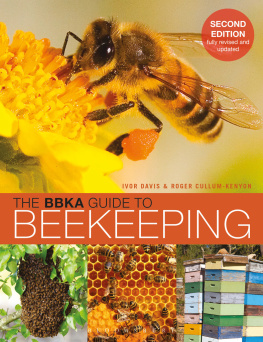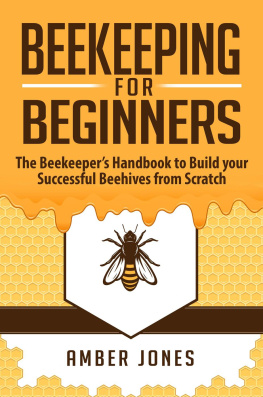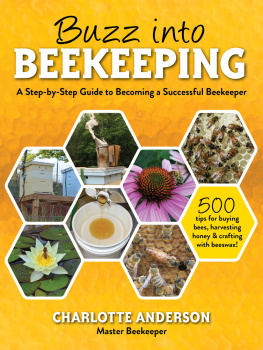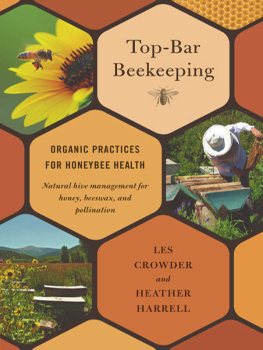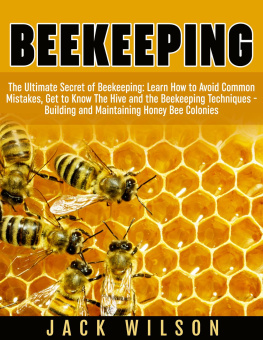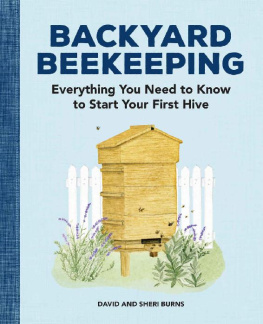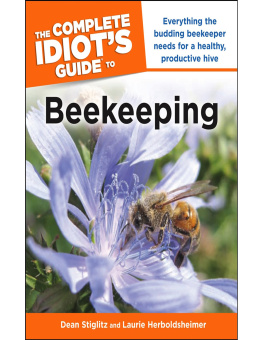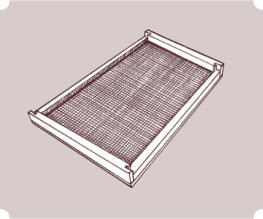

The British Beekeepers Association is a world leading charity supporting honey bees and promoting excellence in beekeeping.
The Association provides an extensive programme of education, resources and advice for beekeepers, together with scientific research into the honey bee to help further our understanding of this insect and the problems now facing pollinators.
For further information about the BBKAs educational, research and other initiatives please visit www.bbka.org.uk
Bloomsbury Natural History
An imprint of Bloomsbury Publishing Plc
50 Bedford Square | 1385 Broadway |
London | New York |
WC1B 3DP | NY 10018 |
UK | USA |
www.bloomsbury.com
Bloomsbury is a registered trademark of Bloomsbury Publishing Plc
First published 2015
This electronic edition first published in 2016
Ivor Davis and Roger Cullum Kenyon, 2015
Photos: Ivor Davis and Roger Cullum Kenyon 2015 and others as acknowledged in the Acknowledgements section.
Ivor Davis and Roger Cullum Kenyon have asserted their right under the Copyright, Designs and Patents Act, 1988, to be identified as Authors of this work.
All rights reserved. No part of this publication may be reproduced or transmitted in any form or by any means, electronic or mechanical, including photocopying, recording, or any information storage or retrieval system, without prior permission in writing from the publishers.
No responsibility for loss caused to any individual or organisation acting on or refraining from action as a result of the material in this publication can be accepted by Bloomsbury or the author.
British Library Cataloguing-in-Publication Data
A catalogue record for this book is available from the British Library.
ISBN: PB: 978-1-4729-2089-8
ePDF: 978-1-4729-2091-1
ePub: 978-1-4729-2090-4
To find out more about our authors and books visit www.bloomsbury.com. Here you will find extracts, author interviews, details of forthcoming events and the option to sign up for our newsletters.
Preface
I became involved in beekeeping about 25 years ago. My wife and I had always been interested in wildlife and especially in butterflies and wild orchids. But initially it was our son who heard about beekeeping and wanted to have a go. This was the start of a rapid learning experience to ensure we cared for the insects we had acquired and prevented them from causing a nuisance to our neighbours.
Eventually I was elected as a trustee of the British Beekeepers Association (BBKA). As a trustee I recognised that the only way to really understand bees and beekeeping was to spend time learning about them both from reading books and attending study groups conducted by true masters of the craft. This was matched with spending more time working with my own bees. Our number of colonies rapidly grew from just four to over 25 and I soon started to take examinations and assessments in bee-keeping. I became a Master Beekeeper and then went on to attain the National Diploma in Beekeeping qualification, the highest qualification available to amateur beekeepers in the UK.
Following the publication of the UK Governments Honey bee health strategy, in 2008, Roger Cullum-Kenyon and I started to work together on a new project with the BBKA which had decided to develop in a comprehensive training package to support beekeeping tutors.
This guide can be used as a companion manual to Beginners or improvers courses. However, even if you do not wish to go on a course the book describes some of the fascination of bees and beekeeping and it is valuable reference source for many aspects of beekeeping.
Many books are available covering all aspects of bees and bee-keeping and, as your interest in beekeeping develops you will undoubtedly be keen to collect a whole library on the subject. This book is supported and endorsed by the BBKA because a useful stand-alone resource for anyone wishing to understand beekeeping.
Beekeeping is a truly absorbing subject which we hope will give you as much pleasure as it has given me.
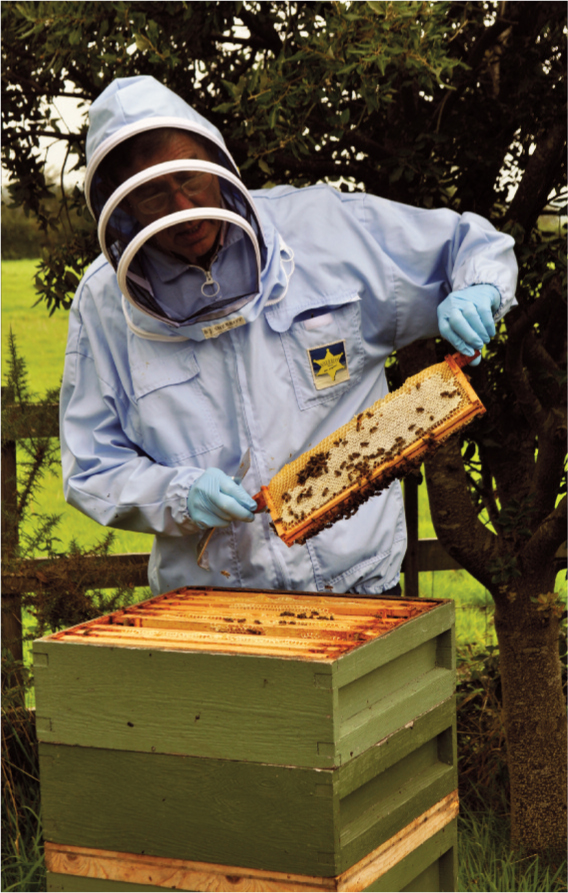
Dr Ivor Davis NDB
Acknowledgements
I am thankful for all the help and encouragement given to me by so many people who are the cream of beekeeping in the UK.
It is impossible to name them all but these are the people who have helped me most. George Simms, sadly no longer with us, was the first to encourage and support me and a few of my colleagues, as we learnt the theory behind bees and beekeeping.
John Hendrie, an ex-trustee of the BBKA and colleague helped me on the road to teaching beekeeping and worked with me to prepare the first tutor pack in support of beekeepers running introductory courses. Ken Basterfield, the NDB education director, helped me to be able to read the bees and learn from them rather than rely simply on what the books say. Everything I learnt from him has helped me to become a better beekeeper. Norman Carreck and David Aston have helped me along the way by always being willing to engage in esoteric discussions about the many aspects of bees and beekeeping and always being capable of answering any question I may have.
I would like to thank the International Bee Research Association (IBRA), for permission to reproduce images from Dr Eva Cranes book The World History of Beekeeping and Honey Hunting.
The anatomical illustrations are from Frank R Cheshires book Bees and Bee-keeping vol.1. Scientific.
Finally, I would like to thank my wife Jan and close family and friends who have been forever patient and supportive of my interest. Jan has also worked very hard for beekeeping organisations at local and national levels and is well known and respected in beekeeping circles.
Dr Ivor Davis NDB
April 2015
The authors would like to thank the following:
Ivors brother Paul who read and corrected the original manuscript and the many friends and colleagues who have been generous with their photographic and illustrative skills. Their contributions to this book are greatly appreciated.
Gerry Collins for his gift of bee related images, Roger who gave up fly-fishing to photograph bees and flowers and design this book. Robin Dartington for details of his hive, Ann Holderness for her queen mating image, Julian Routh and Jo Widdicombe for images of bees and equipment. Defra for permission to use images of pests and diseases and Omlet for the Beehaus image.
We also wish to express our thanks to Lisa Thomas our tireless editor at Bloomsbury Natural History and Bill Stevens of National Bee Supplies, for lending us hives and many other bee-keeping items to photograph as well as Martyn Norsworthy for the studio images.
Foreword
It is with great pleasure that I write this foreword to the second edition of the BBKA Guide to Beekeeping.
Taking up a new craft is both exciting and challenging and never more so than with beekeeping. We have co-existed with honey bees for a very long time and we increasingly recognise the importance that honey bees have played in providing sweetness to our diet, bees wax for light and most importantly the pollination of fruit and crops vital to human survival.

